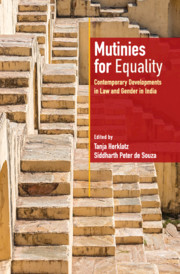7 - Nikah Halala: The Petition, the Promise and the Politics of Personal Law
Published online by Cambridge University Press: 08 June 2021
Summary
Introduction
This chapter analyses a series of petitions filed in the year 2018 by individual women, women's organisations and members of political parties against the practice of nikah halala. Nikah halala translates as a type of marriage (nikah) through which a wife is made eligible or lawful (halala) to reunite with her husband after the couple has been divorced. In practice, this meant that upon divorce from her husband, a woman could only remarry that same man after marrying another man, consummating her second marriage and then divorcing the second husband, to reconcile with the first. This customary practice was allegedly introduced to make reconciliation between divorced couples more difficult in order to discourage frivolous divorce. This inherently tied the practice of nikah halala to that of triple talaq—or the oral unilateral divorce that a Muslim husband had the exclusive right to pronounce, by simply uttering the word ‘talaq’ three times. The practice of triple talaq has witnessed tremendous public, political and scholarly attention in the past decade. The Supreme Court deemed the practice invalid in 2017 and subsequently the Indian parliament criminalised it in 2019 under the controversial Muslim Women's (Protection of Rights on Marriage) Act. The Supreme Court had refused to consider nikah halala and polygamy as related matters while hearing the triple talaq case. But in 2018, both issues re-emerged before the Court through multiple petitions.
By analysing petitions against nikah halala and the representation of Muslim women therein, retrieved from the legal archive of written documents produced by lawyers, munshis (secretaries or writers), clerks, social activists and judges, this chapter makes two central claims. First, the legal archive produced through petitions, judgments, legislative debates, police records, and so on, is not representative of the spectrum of legal experience, nor can the language of law capture the experience of violence endured by women in a dispute involving nikah halala. Yet the unrecorded and unwritten experience of engaging the law provides meaningful insights on women's relationship with the state, religious community and contemporary politics. Second, the incoherence of legal communications, the uncertain implications of legislative and judicial interventions on personal law, multiplicity of adjudication forums, and the misunderstandings that surround the interpretations of religious law and practice invariably decentralise authority over authentic religious knowledge.
- Type
- Chapter
- Information
- Mutinies for EqualityContemporary Developments in Law and Gender in India, pp. 133 - 154Publisher: Cambridge University PressPrint publication year: 2021

